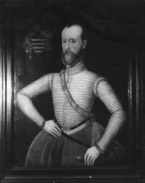With both his translations and other writings William Tyndale was now the most significant Englishman in the movement we know as the Reformation. In the summer of 1534 he took up lodgings in Antwerp with Thomas Poyntz, an English merchant, and his wife Anna.
William Tyndale had long been asked for a second, corrected and improved, edition of his New Testament. In the summer of 1534 his former assistant George Joye edited a new edition as Tyndale himself seemed to have taken little action in the matter. This infuriated Tyndale. Joye had not consulted him and had not made clear his own responsibility for changes to the text. These changes Tyndale believed to be quite inaccurate. He set to work to produce his own revision. He needed somewhere safe and quiet to get on with this task as a matter of urgency and this place was to be in the household of Thomas Poyntz.
It should have been a relatively safe place for him. Whatever the heresy laws in force in Antwerp, it was in general a much more relaxed city in this regard than in many other parts of the Holy Roman Empire. The authorities were particularly likely to be lenient with English merchants in view of their economic value to the city. So long as Tyndale remained in a house linked with the English merchant community he was unlikely to be troubled.
There is no record of where he had been living previously. Possibly he had been at the main English House. It seems likely that the governor of The English House at this moment was Humphrey Monmouth who had given support to Tyndale back in London in 1523 and 1524. If this is correct it is possible that Tyndale had been a guest in the English House and that when Monmouth's term of duty expired in July 1534, and he was no longer in such regular contact with Antwerp, he looked for someone to take over the role of Tyndale's host. The new governor, or other merchants, may have been less happy at having such a known heretic in their midst.
Tyndale was described as being at this time 'a man very frugal and spare of body, an earnest labourer in the setting forth of the scriptures of God'. Once settled in the Poyntz household he would have been concentrating on the revised New Testament which was finally published in November 1534. This translation has been described by David Daniell as "the glory of his life's work". Once this was completed, Tyndale would have turned back to continue his translation from Hebrew of the Old Testament books. Much had already been done but much remained to do.
According to John Foxe† he was in the habit of giving over two days a week to visiting and assisting both religious refugees from England and the local poor. The other activity, described in the same source, seems very probable. "When the Sunday came, then went he to some one merchants' chamber or other, whither came many other merchants, and unto them would he read some one parcel of scripture : the which proceeded so fruitfully, sweetly, and gently from him … that it was a heavenly comfort and joy to the audience to hear him read the scriptures; likewise, after dinner, he spent an hour in the same manner."
© Brian Buxton 2013
 Thomas Poyntz
Thomas Poyntz